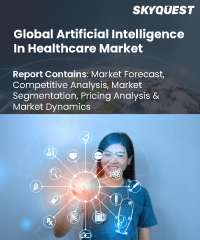
Report ID: SQMIG35G2090

Report ID:
SQMIG35G2090 |
Region:
Global |
Published Date: July, 2024
Pages:
219
|
Tables:
143 |
Figures:
77
Artificial Intelligence In Healthcare Market Drivers
Improved Diagnostic Accuracy and Generalized Medication
Increasing Efficiency and Operating Costs
Artificial Intelligence In Healthcare Market Restraints
High Implementation Costs and Technical Difficulties
Data Privacy and Security Issues
Our industry expert will work with you to provide you with customized data in a short amount of time.
REQUEST FREE CUSTOMIZATIONWant to customize this report? This report can be personalized according to your needs. Our analysts and industry experts will work directly with you to understand your requirements and provide you with customized data in a short amount of time. We offer $1000 worth of FREE customization at the time of purchase.

Report ID: SQMIG35G2090